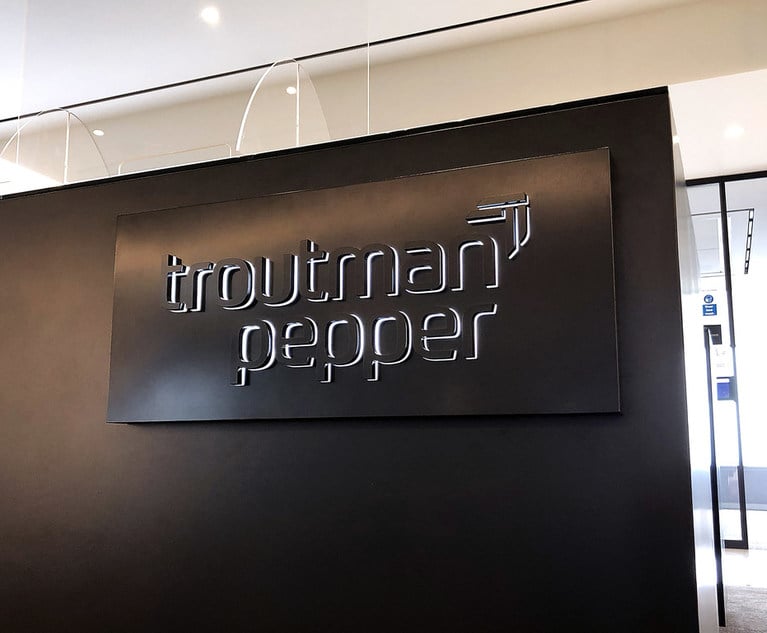Justices Agree to Mull Calculation of Overtime Pay for Salaried Employees
The Pennsylvania Supreme Court has agreed to consider whether the fluctuating workweek method for calculating overtime payments for salaried employees violates state law.
July 16, 2018 at 04:52 PM
4 minute read
 Photo: Wikimedia Commons
Photo: Wikimedia Commons
The Pennsylvania Supreme Court has agreed to consider whether the fluctuating workweek method for calculating overtime payments for salaried employees violates state law.
The justices on Monday agreed to hear an appeal in the case Chevalier v. General Nutrition Centers to specifically address whether Pennsylvania's Minimum Wage Act allows an employer to pay a salaried employee half of their regular rate for every hour worked over 40 in a given week, rather than one-and-a-half times their regular salary for each overtime hour.
Late last year, a split three-judge panel reversed the decision of an Allegheny County Court of Common Pleas judge and said that paying only half of the salaried employee's regular rate violated the law. Instead, the court said, employers must pay an additional 150 percent of the employee's regular rate when paying overtime.
Michael Simon of Roe & Simon, who represented the plaintiffs, said he hopes the Supreme Court affirms the Superior Court's ruling.
“The Common Pleas Court decided the issue, and decided it consistent with three federal courts, and the appellate court agreed. The Pennsylvania Department of Labor refused to give an opinion as to the scope of the law, so as far as we're concerned, the question was decided correctly in the courts below,” Simon said. “We hope the Supreme Court affirms.”
Judge H. Geoffrey Moulton Jr., who wrote the Superior Court's precedential opinion, noted that, although federal regulations allow companies to pay half an employee's regular rate, the PMWA clearly states that employers must pay one and one-half, or 150 percent, of the employee's regular rate for every hour worked over 40.
“In addition, the secretary [of Labor and Industry] chose not to adopt the federal regulation that expressly authorizes the one-half multiplier used by GNC,” Moulton said. “Taken together, these regulatory choices compel the conclusion that GNC's payment of an overtime premium of only one-half the 'regular rate' violates Pennsylvania law.”
Although that ruling was a win for plaintiff Tawny Chevalier and Andrew Hiller, GNC employees who are pursuing a class action against the company over its overtime policies, Moulton also determined that GNC was using the appropriate method for determining the “regular rate” of salaried employees—an issue that was also in dispute before the Superior Court, but has not been taken up as part of the appeal before the Supreme Court.
Regarding the regular rate, the employees had argued that companies in Pennsylvania should divide their weekly salary by 40 hours to determine each employee's “regular rate” that would then form the basis for calculating their overtime earnings. GNC, however, argued that its method of dividing each employee's salary by the total number of hours he or she worked each week was the proper method for establishing an employee's “regular rate” each week.
Although GNC's preferred method tends to fluctuate each week, it would consistently establish a lower rate than dividing each employee's weekly salary by 40, Moulton noted.
Regarding whether the 50 percent or 150 percent multiplier should be used for overtime, GNC contended its method of adding only half of the regular rate to the overtime hours is proper, because the employee's straight salary essentially covers the first 100 percent of the overtime compensation, which is how overtime is calculated under the federal Fair Labor Standards Act.
Moulton, however, disagreed.
“Had the department wanted to authorize one-half time payment for employees such as plaintiff here, it surely knew how to do so,” Moulton said. “This observation is reinforced by the department's decision, undoubtedly a conscious one, to not adopt the federal regulation that expressly authorizes the one-half times regular rate overtime premium.”
Robert Pritchard of Littler Mendelson, who represented GNC, did not return a call for comment.
This content has been archived. It is available through our partners, LexisNexis® and Bloomberg Law.
To view this content, please continue to their sites.
Not a Lexis Subscriber?
Subscribe Now
Not a Bloomberg Law Subscriber?
Subscribe Now
NOT FOR REPRINT
© 2025 ALM Global, LLC, All Rights Reserved. Request academic re-use from www.copyright.com. All other uses, submit a request to [email protected]. For more information visit Asset & Logo Licensing.
You Might Like
View All
Troutman Pepper Says Ex-Associate Who Alleged Racial Discrimination Lost Job Because of Failure to Improve
6 minute read
Boosting Litigation and Employee Benefits Practices, Two Am Law 100 Firms Grow in Pittsburgh
3 minute read
Best Practices for Conducting Workplace Investigations: A Legal and HR Perspective
9 minute read
The Intersection of Labor Law and Politics Following the Presidential Election
8 minute readTrending Stories
- 1States Accuse Trump of Thwarting Court's Funding Restoration Order
- 2Microsoft Becomes Latest Tech Company to Face Claims of Stealing Marketing Commissions From Influencers
- 3Coral Gables Attorney Busted for Stalking Lawyer
- 4Trump's DOJ Delays Releasing Jan. 6 FBI Agents List Under Consent Order
- 5Securities Report Says That 2024 Settlements Passed a Total of $5.2B
Who Got The Work
J. Brugh Lower of Gibbons has entered an appearance for industrial equipment supplier Devco Corporation in a pending trademark infringement lawsuit. The suit, accusing the defendant of selling knock-off Graco products, was filed Dec. 18 in New Jersey District Court by Rivkin Radler on behalf of Graco Inc. and Graco Minnesota. The case, assigned to U.S. District Judge Zahid N. Quraishi, is 3:24-cv-11294, Graco Inc. et al v. Devco Corporation.
Who Got The Work
Rebecca Maller-Stein and Kent A. Yalowitz of Arnold & Porter Kaye Scholer have entered their appearances for Hanaco Venture Capital and its executives, Lior Prosor and David Frankel, in a pending securities lawsuit. The action, filed on Dec. 24 in New York Southern District Court by Zell, Aron & Co. on behalf of Goldeneye Advisors, accuses the defendants of negligently and fraudulently managing the plaintiff's $1 million investment. The case, assigned to U.S. District Judge Vernon S. Broderick, is 1:24-cv-09918, Goldeneye Advisors, LLC v. Hanaco Venture Capital, Ltd. et al.
Who Got The Work
Attorneys from A&O Shearman has stepped in as defense counsel for Toronto-Dominion Bank and other defendants in a pending securities class action. The suit, filed Dec. 11 in New York Southern District Court by Bleichmar Fonti & Auld, accuses the defendants of concealing the bank's 'pervasive' deficiencies in regards to its compliance with the Bank Secrecy Act and the quality of its anti-money laundering controls. The case, assigned to U.S. District Judge Arun Subramanian, is 1:24-cv-09445, Gonzalez v. The Toronto-Dominion Bank et al.
Who Got The Work
Crown Castle International, a Pennsylvania company providing shared communications infrastructure, has turned to Luke D. Wolf of Gordon Rees Scully Mansukhani to fend off a pending breach-of-contract lawsuit. The court action, filed Nov. 25 in Michigan Eastern District Court by Hooper Hathaway PC on behalf of The Town Residences LLC, accuses Crown Castle of failing to transfer approximately $30,000 in utility payments from T-Mobile in breach of a roof-top lease and assignment agreement. The case, assigned to U.S. District Judge Susan K. Declercq, is 2:24-cv-13131, The Town Residences LLC v. T-Mobile US, Inc. et al.
Who Got The Work
Wilfred P. Coronato and Daniel M. Schwartz of McCarter & English have stepped in as defense counsel to Electrolux Home Products Inc. in a pending product liability lawsuit. The court action, filed Nov. 26 in New York Eastern District Court by Poulos Lopiccolo PC and Nagel Rice LLP on behalf of David Stern, alleges that the defendant's refrigerators’ drawers and shelving repeatedly break and fall apart within months after purchase. The case, assigned to U.S. District Judge Joan M. Azrack, is 2:24-cv-08204, Stern v. Electrolux Home Products, Inc.
Featured Firms
Law Offices of Gary Martin Hays & Associates, P.C.
(470) 294-1674
Law Offices of Mark E. Salomone
(857) 444-6468
Smith & Hassler
(713) 739-1250





